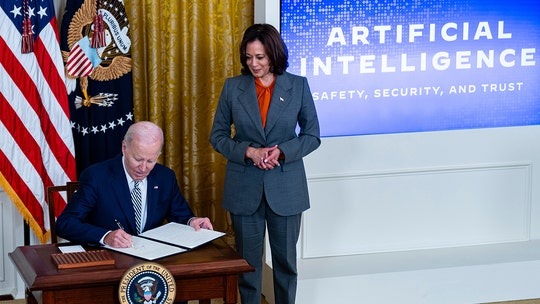In the face of China's growing technological prowess, Democrat Missouri Senate candidate Lucas Kunce advocates for an ambitious agenda prioritizing American supremacy in artificial intelligence (AI), particularly in the military domain. Kunce emphasizes the urgent need to establish international guardrails while preventing adversarial nations from weaponizing AI.
America faces a pivotal moment in its technological trajectory, with China emerging as a formidable competitor in the development and deployment of artificial intelligence (AI). Democrat Missouri Senate candidate Lucas Kunce has unveiled a comprehensive political and economic agenda that places paramount importance on AI, recognizing its potential to reshape the global landscape.

America's AI Imperative: Outmaneuvering China in the Technological Race
Kunce's vision is driven by the belief that the United States must "beat China in everything" concerning the next generation of technology. He views AI as a critical component of America's future security and economic prosperity.
This month, China abstained from endorsing an international blueprint for responsible AI use in the military domain, highlighting its reluctance to abide by multilateral agreements. AI expert Arthur Herman interprets this move as a reflection of China's general opposition to external influence and its strategic intent to maintain its military advantage.

America's AI Imperative: Outmaneuvering China in the Technological Race
The blueprint, agreed upon by approximately 60 nations, aims to establish safeguards for AI in military settings, ensuring that human control remains paramount. Nations like the United States prioritize human supervision to prevent unintended casualties and machine-driven conflicts.
The Netherlands, Singapore, Kenya, and the United Kingdom co-hosted the summit that produced the blueprint. It marks the second such gathering following a similar event in the Dutch capital last year. China's absence from this crucial agreement raises concerns about its intentions regarding AI governance.

America's AI Imperative: Outmaneuvering China in the Technological Race
Chinese Foreign Ministry spokesperson Mao Ning has stated that China sent a delegation to the summit and shared its principles on AI governance. However, she offered no explanation for China's refusal to support the blueprint.
Herman cautions that while multilateral agreements are vital for safeguarding AI practices, they may not effectively deter nations like China, Russia, and Iran from pursuing malign AI technologies. He argues that deterrence is more effective, particularly in the context of nuclear proliferation or missile technology.

America's AI Imperative: Outmaneuvering China in the Technological Race
Kunce's agenda emphasizes the need for a robust AI strategy, including investments in research and development, workforce training, and international cooperation to establish global standards for AI deployment. He believes that America must lead the way in responsible AI innovation.
The United States and its allies recognize the risks associated with the weaponization of AI. They aim to constrain such practices by making clear that they will not hesitate to use similar technologies in self-defense.

America's AI Imperative: Outmaneuvering China in the Technological Race
America's ambition to outmaneuver China in AI is rooted in its desire to safeguard its security, maintain economic competitiveness, and preserve ethical standards in the face of advancing technology. Kunce's policy proposals offer a roadmap for achieving these objectives.










